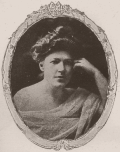Decoration Poem (Gather them out of the valley ...)
by Ella Wheeler Wilcox
Gather them out of the valley --
Bring them from moorland and hill,
And cast them in wreaths and in garlands,
On the city so silent and still --
So voiceless, so silent, and still;
Where neighbor speaks never to neighbor,
Where the song of the bird, and the brown bee is heard,
But never the harsh sounds of labor.
Bring them from woodland and meadow --
As fresh, and as fair, as can be.
Bring them, all kinds, and all colors,
That grow upon upland and lea --
That spring in wild grace on the lea.
And rifle the green earth's warm bosom
Of each flower, and blow, till God's acre
shall glow
And bloom, like a garden in blossom.
Bring them from vase, and from hot-house,
And strew them with bountiful hand.
There is nothing too rare for the soldier,
Who laid down his life for his land --
Who laid down all things for his land;
And turned to the duty before him,
And how now can we prove, our thanks and our love
But by casting these May blossoms o'er him.
We know they will soon fade, and wither --
We know they will soon droop, and die;
But one time, I read, how an angel
Came down from the mansions on high --
In the night, from God's kingdom on high --
Came down where a poor faded flower
Lay crushed by rude feet, in the dust of the street,
And he carried it up to God's bower;
And laid it before the Good Master,
Who kissed it, and passed it to Christ,
On the throne at His side; and He kissed it,
And the touch of those kisses sufficed --
The caress of the God-head sufficed --
And it bloomed out in wonderful splendor,
A thing of delight, and most fair in God's sight --
'Tis a fable, I know; but so tender;
So sweet that I like to believe it --
And I have been thinking, to-day,
That mayhap these soldiers, now angels,
Will come, when these wreathes fade away --
When they wither, and shrivel away --
And will bear the crushed things up to heaven,
And God, and His Son. will kiss them, each one,
And new beauty, and bloom will be given.
And odd fancy, perhaps, yet dispute it,
And prove it untrue if you can.
There are strange, subtle ways, in God's workings
Now veiled from the knowledge of man, --
Shut out from the vision of man.
By a dark veil of deep, mortal blindness;
But when God deems it right, He will give us our sight,
And remove the thick veil, in His kindness;
And when we have entered His kingdom,
And all his strange ways understand,
Who knows but these very same flowers,
We shall find there abloom, in His land,
All fresh, and all fair, in His land;
And these soldiers, who went on before us,
As we wander and stray, through God's gardens, shall say:These are the wreathes you cast o'er us.
Then, strew ye the best, and the brightest
Of buds, and of blossoms full blown,
Over the graves, of the loved ones --
Over those labelled Unknown!
Oh! the pathos of that word, Unknown!
Bring hither the brightest, and rarest!
We reck not, if the clay, wore the blue garb, or gray!
We will give them the best, and the fairest.
For somebody mourned for the missing,
And wept for them hot, scalding tears,
And hoped against hope, for their coming;
And watched, and waited, months and years,
Such long, and such desolate years!
But the hearts are so patient, that love them,
And some now watch and weep, for the soldiers who sleep
With the slab labeled Unknown
above them.
Then gather from meadow, and woodland,
From garden, and hot-house, and vase,
The brightest and choicest of blossoms,
And scatter them here in this place;
This holy and hallowed place --
This city of rest, not of labor,
Where only the bird, and th' brown bee is heard,
And neighbor, speaks never to neighbor.
Forest Hill Cemetery, May 30, 1871.
Source:
ShellsCopyright 1873
Hauser & Storey, Milwaukee
